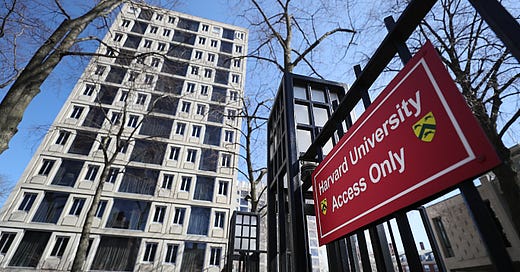Weekend reads: Chuck your privilege
Unlike other forms of privilege, there is something real you can do with your money.
In the spring of 2022, shortly after I left the CBC, I read a remarkable essay. It was by the American critic William Deresiewicz, and it was about his disillusionment with NPR after 30 years of listening to the network. Almost overnight, he felt, it had changed. “Every segment was about race, and when it wasn’t about race, it was about gender,” the former Yale professor wrote at UnHerd. “The stories were no longer reports but morality plays, with predictable bad guys and good guys. Scepticism was banished. Divergent opinions were banished. The pronouncements of activists, the arguments of ideologically motivated academics, were accepted without question. The tone became smug, certain, self-righteous. To turn on the network was to be subjected to a program of ideological force-feeding. I was used to the idiocies of the academic Left — I had been dealing with them ever since I started graduate school — but now they were leaking out of my radio.”
These sentences — and indeed the entire essay, about the destabilizing act of leaving one’s tribe — so captured my own experience in public broadcasting that I almost cried with relief when I read it. So, when William Deresiewicz published a new book later in 2022, The End of Solitude, of course I had him on the podcast for a conversation. It has stayed with me all year.
Lean Out will be bringing you guest posts throughout the fall, and I can’t think of a more fitting writer to kick off this feature than William Deresiewicz. In this provocative and timely essay, originally published at Persuasion, he tackles the one form of privilege that activists at elite schools are not interested in checking. I’m thrilled to have William Deresiewicz as Lean Out’s first guest contributor. — TH
Dear elite college students of America,
Welcome back to campus for the next installment of your charmed existence. Welcome back to the sun-kissed lawns of Stanford, the dreaming Gothic spires of Yale, the stately halls of Princeton and Williams and Amherst and Smith.
Welcome back to another year of higher education in the age of “social justice.” You will be spoon fed watered-down Foucault, offered little bites of Butler, and enticed to snack on crunchy nuggets of Kendi. You will protest violent statues, threatening food, and abusive Halloween costumes. And you will tell each other, no doubt many times, to check your privilege: as male or white or straight or cis or neurotypical or nondisabled.
But here’s the thing. It is very convenient to talk about checking your privilege as a member of any of those groups, because that’s all you can do with it. You can’t diminish it, get rid of it, or transfer it to anybody else. You were born with it, and it is yours for life. So “checking” it, aside from a little discomfort, is pretty much pain-free.
Meanwhile, there is a form of privilege that you can do something about, and it’s by far the most important one you have. It is the privilege of money, or in other words, of class.
I understand that you probably don’t realize that you have it, because the world you come from — your parents, your community, your college — does everything it can to shield you from that awful truth, mainly by denying it itself. But you almost certainly do.
For example, I was speaking several years ago with a recent graduate of Haverford (for the record, she was African-American). “So your family is middle-class?” I asked. “Yes,” she said. “We live in a cul-de-sac, and I went to a private high school. My father’s a cardiologist, and my mother is an anesthesiologist. So it’s not like we’re rich.” When I got off the phone, I ran the numbers. If her parents earned the median salary for each of their respective specialties (and didn’t have investment income), their household total came to $770,000 — comfortably within the 1%.
If you go to an elite private college, chances are very good that you come from the top fifth of the income distribution: the upper or the upper-middle class. Maybe you go to one of the 50 schools (all but one of them private) where, as of 2017, students came from households with median incomes of at least $176,200. Maybe you go to Oberlin ($178,000) or Wesleyan ($192,000) or Brown ($204,000) or Middlebury ($244,000) or Colorado College ($278,000).
And even if you do not come from money, that is where you’re headed, no? Why did you kill yourself to get into an elite college in the first place? So you can “change the world”? Please. You did it, you’re doing it — no matter where you come from, no matter what you tell yourself — to secure your place in the elite, a process known as “getting to the top.” You’re doing it for the money, or, at least, the status (which, in this society, is closely intertwined with money).
Changing the world, if it comes anywhere at all, comes second. A friend of mine who teaches in the Ivy League once told me that her students do indeed talk a lot about making the world a better place, but their idea of how to do so invariably involves some version of getting to the top: becoming a federal judge, writing for the New York Times, founding a tech company, running a socially conscious investment fund. So be honest: if you had to choose — either money and/or status, or changing the world — which would you go for? I thought so.
But unlike other forms of privilege, there is something real that you can do with your money: the money you grew up with, or the money you are heading towards. You can renounce it.
You can refuse to take advantage of your parents’ wealth. You can decline to let them pay for college, or for graduate school. You can rebuff them when they offer to support you while you do an internship. You can tell them that you will not let them float you through your twenties. You can give away your trust fund.
You can also refuse to take advantage of your institution’s wealth: that giant endowment, much of it invested in companies that do business in places like China, where they have concentration camps and slave labor, that pays for all those fabulous amenities.
You can refuse to take advantage of the opportunities that going to your school makes possible. I mean especially the opportunities to make a lot of money: to go into banking or consulting or law or medicine or tech, the five main occupations that elite college graduates now enter, all of which (no doubt by complete coincidence) are highly lucrative, and four of which do much more harm than good.
And since we’re talking about status, as well — another form of privilege that you were born with and/or have been gouging eyeballs to obtain — you can renounce that, too. You can forsake all those connections that you’ve made, or might make in the future, through your parents or your parents’ friends or your classmates or your alumni network. You can stop dropping the name of your goddamn school.
Of course, none of this would be easy. It might mean taking on a lot of debt, or working your way through school, or transferring to a less prestigious university, maybe even, God forbid, a community college. It might mean scraping by for many years: worrying about the rent, or the cost of health insurance, or about sending your kids to a decent school. It would almost certainly mean learning to do without a lot of what you took for granted growing up. But you care about privilege, right?
Look, almost no one does the things I just suggested. I’m from a comfortable family, and I sure as hell didn’t do them. But if you aren’t going to do them, then at least have the decency to cut the crap about other people’s “privilege,” which is just a way of distracting yourself from your own. You’re all privileged, you golden youth. Be grateful. Be humble. Be real.
William Deresiewicz is an essayist and critic. He is the author of five books, including Excellent Sheep: The Miseducation of the American Elite and The Way to a Meaningful Life and The End of Solitude: Selected Essays on Culture and Society. You can listen to our podcast conversation about that book here.
Stay tuned, Persuasion founder Yascha Mounk will be on the podcast this week, talking about his new book The Identity Trap: A Story of Ideas and Power in Our Time.






About 5 years ago my wife was in conversation with a woman that she was taking a coaching coarse in California with. The other woman (who went to Yale) started to talk to my wife about her "white privilege" and how it was bad. At that point, my wife had to tell her that she was born in rural Ireland in a house with no running water or central heating. Her father, along with all the other men in the village, had to leave their farms, and go to England every year for a month to pick the English potato crop. As an Irish Catholic, until recently if she was entering the US from Canada, where she now lives, she could expect to be questioned about her affiliation with the IRA, as after all, she must be a terrorist.
So much for the assumptions associated with "white privilege".
I think most of us living so called regular lives know by now the privilege/circumstance which makes the most difference in most folks’ lives is economic. But it doesn’t get air time because it would require the most self-examination, acts of will, and plain work. Easy for our PM to walk in a pride parade and bang on about whatever immutable characteristics + privilege. Not so easy to solve the mess that is the Canadian housing crisis. It speaks to my fatigue around such things that I almost feel relieved now when I encounter someone who has economic ‘privilege’ and just lives their life without apology or self-recrimination. It may not be generous but at least it’s honest.